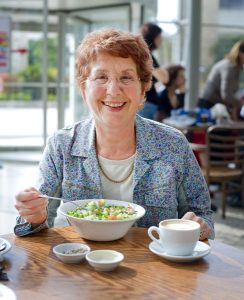Did you know that a good memory starts with a good diet?
Keeping your memory sharp as you age. Who would not want that? Combine a healthy diet with an active lifestyle and you have a great chance to having a good memory.
Lately, Mr Jones (81 years old) has become quite forgetful. He can’t quite remember the names of relatives or that, recently, his children gave him the gift of a weekend in London. Chances are that Mr Jones is suffering from early-stage dementia. He is not alone: as many as one in five people get this disease. Currently, in the Netherlands, around 250,000 people suffer from it and, as the aging population grows, so will this number. Because the older you are, the more likely you are to get it. An 80-plusser has a 20% chance of getting dementia; in people over 90 this chance increases to at least 40%.
An 80-plusser has a 20% chance of getting dementia; in people over 90 the chance increases to at least 40%.
Medicine or food?
 Unfortunately, there is no cure for dementia. But what pills can’t do, a healthy diet can, perhaps. It is proven that dietary change can slow down the onset of loss of bone density and muscle mass, so why not use it to keep your brain in shape?
Unfortunately, there is no cure for dementia. But what pills can’t do, a healthy diet can, perhaps. It is proven that dietary change can slow down the onset of loss of bone density and muscle mass, so why not use it to keep your brain in shape?
Worldwide, researchers are focussed on the relationship between nutrition and cognitive decline. Individual nutrients like omega-3 fatty acids, B vitamins, vitamin D and antioxidants are receiving lots of attention, but the results are disappointing so far: significant effects are yet to be found.
Complete package for a good memory
Yet, I am convinced that healthy food certainly does make a difference, but probably as part of a complete package. A good and varied diet, preferably linked to an active life – socially, physically and mentally – so that your brains also have the chance to stay well trained.
At Wageningen University, within the European research program NU-AGE, we are coordinating a large, one-year study on the effects of this complete package. The project involves more than 1,200 over 65s, from five different European countries.
Mediterranean diet
 The elderly participating in the study follow a diet that meets official European minimum dietary guidelines for a balanced diet. This diet shares many characteristics with the ‘Mediterranean’ diet: rich in fish, fruits, vegetables, wholegrain cereals, legumes and olive oil. Previous research has proved that such a diet not only helps to prevent cardiovascular diseases, but probably also slows-down memory loss and the onset of dementia. Together with my colleagues, I recently published an overview of the latest research insights in the journal Advances in Nutrition.
The elderly participating in the study follow a diet that meets official European minimum dietary guidelines for a balanced diet. This diet shares many characteristics with the ‘Mediterranean’ diet: rich in fish, fruits, vegetables, wholegrain cereals, legumes and olive oil. Previous research has proved that such a diet not only helps to prevent cardiovascular diseases, but probably also slows-down memory loss and the onset of dementia. Together with my colleagues, I recently published an overview of the latest research insights in the journal Advances in Nutrition.
I’m looking forward to next year, when the results of the NU-AGE study will be published. Then we will have more clarity about how a healthy diet can help keep brains in shape. And then we’ll be able to give evidence-based advice to Mr Jones and all the other people who are worried about becoming forgetful.
Please leave a comment below.


Zeer bijzonder dat er onderzoeken op het gebied van voeding plaatsvinden.
Voeding is naar mijn smaak in de benadering van de gezondheidszorg nog onderbelicht.
Zo ben ik geïnteresseerd in vitamine d gebruik bij epilepsie en medicatie. Ook bij het epilepsie centrum kunnen ze mij niet aan informatie helpen.
Ook verdere dieet voorschriften zouden naar mijn idee bij kunnen dragen aan verbetering van de klachten bij mijn zoon.
Misschien bent u niet in de gelegenheid om individueel vragen te beantwoorden. Maar dan weet u wat er leeft.
In ieder geval dank ik u voor het bekijken van de mail.
Gr vera vos
Beste Vera,
Er vindt veel onderzoek op het gebied van voeding plaats, maar niet iedereen acht het belang ervan even groot. Wat betreft uw specifieke vraag met betrekking tot de rol van voeding in relatie tot epilepsie kan ik u helaas ook niet verder helpen, aangezien ik me hier tot op heden ook nog nooit in verdiept heb. Heeft u wel eens een diëtist gevraagd? Wellicht dat die u wat verder zou kunnen helpen. Sterkte ermee in ieder geval en bedankt voor uw bericht.
groeten Ondine
Dear colleagues
I would like to suggest you to include in your research a people group with a diet based on organic food and without OGM.
Thanks and good luck to your research.
All the best to you
Maria Nunes
Dear Maria Nunes,
Thank you for your message and your suggestion. This is indeed also an interesting area of research. We are mostly dependent on research grants and their prioritizing, but if this topic is once on the list of key topics we will see if we can incorporate it.
Best regards,
Ondine
Dear colleagues
I would like to suggest you to include in your research a people group with a diet based on organic food and without OGM.
Thanks and good luck to your research.
All the best to you
Dear Dr. Ondine
Just read about your research on Omega-3 fatty acids on cognitive functioning etc. Do like to be posted when the results are published.
best wishes
Kashi
Dear Kashi,
Thank you for your message and your interest. I will see if I get the chance to post about future results here, else you can follow me on Research Gate or check Pubmed every now and then.
Best regards,
Ondine